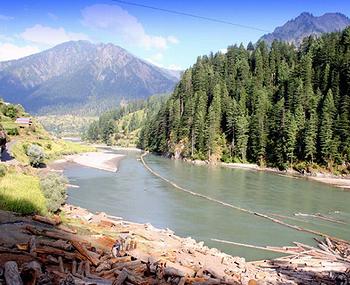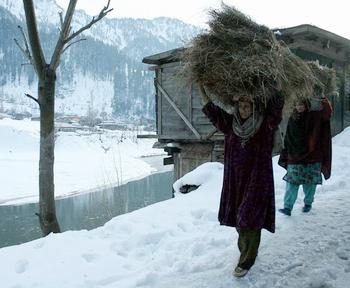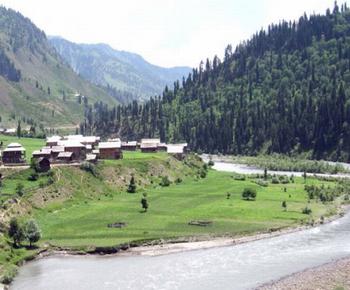Kashmir Plans Logging Crackdown to Slow Deforestation
-----------------
MUZAFFARABAD, Azad Jammu and Kashmir, January 25, 2010 (ENS) - Yousaf Butt, a timber worker in the Neelum Valley at the Line of Control in Kashmir, is worried about his job because of government plans to enforce a ban on the cutting of trees.
Butt and his colleagues fear the decision will shut down operations of their employer, Azad Kashmir Logging and Saw Mills, AKLAS, a semi-government firm that extracts timber from Pakistani Kashmir and supplies the wood to companies across Pakistan.
"Jungle is everything for us. My wife brings fodder and fuel wood and children collect mushrooms from nearby forest," says Butt. He is not aware of the environmental consequences of tree felling in his area, nor do his bosses consider the great loss caused by the depletion of forests.
 |
Wood is wasting at a government depot on the Neelum River. (Photo © Asif Mir) |
Currently, the government of Azad Jammu and Kashmir is planning forest conservation measures, including a crackdown on the cutting of green trees. A ban was initially proposed in 1997 but was not implemented because of lack of political will and alleged benefits gained by government functionaries who are accused of corruption and involvement in the timber trade.
Government is also facing resistance from AKLAS employees who believe that implementation of the ban would put an end to the timber industry.
Local traders have similar concerns about government conservation measures. "By imposing a bar on the cutting of trees, government wants to make 3,000 jobless who earn their daily bread from the timber business," fears trader Shafiq Khawaja.
On the other hand, ecologists and environmental campaigners hail the government's plan and demand protection of the forests.
"Plenty of timber wood is waiting for transportation in the jungles and logging depots for many years, which is enough to meet the public requirements," said Naseer, a community worker. He suggests that if AKLAS is disbanded, any surplus staff could be absorbed into the forest and agriculture departments.
Located in the north of Pakistan in the foothills of the Himalayas, the state of Azad Jammu and Kashmir plays a vital role in the economy of Pakistan. AJK is known as a forestry state with 42 percent of its 13,297 square kilometres (5,134 sq miles) under the control of the Forest Department.
According to state forest laws, the government can sell only damaged trees after a necessary assessment by forest officials. However, powerful timber mafia illegally chop and smuggle green trees under the cover of operations to extract sick or fallen trees.
 |
Neelum Valley women carrying fuel wood and fodder (Photo © Asif Mir) |
Sometimes, forests are set on fire by the timber mafia to justify the damage of trees, a practice which has caused enormous loss to local forests and wildlife habitats. Officials admit that during the last 20 years more than five percent of the AJK forests have vanished.
This eco-region is a prime location for endangered plant and animal species. These temperate forests are of Himalayan Cedar, Cedrus deodara; Chalghoza pine, Pinus gerardiana; and Holm oak, Quercus ilex, a large evergreen oak.
Most of the wood is sold to Pakistani furniture and flooring firms, which make products for customers in Europe and the United States.
Climate change is taking its toll. These days, Butt and his fellow villagers have to store less fuel wood for winter than they did in past years when life ceased for months because of heavy snowfall. But the snow level has decreased and the villagers welcome its more rapid melting.
Three main rivers of the region - Poonch, Jhelum and Neelum - flow from Azad Jammu and Kashmir towards Pakistan. They play a vital strategic role in the economy of the country and livelihood of the people as they supply water to one of the largest irrigation systems in the world, which draws water from the Turbela and Mangla Reservoirs.
With a population of 3.5 million, Azad Jammu and Kashmir is a densely populated area. More than 88 percent of the population lives in rural areas and depends on forests for fuel wood, timber, grazing and water. Eighty-nine percent of households in AJK use wood for cooking and space heating, including half the people living in urban areas. At least 98 percent of the rural population depends on forests for grazing animals.
The majority of the income of the area comes from timber revenue, royalties from the Mangla Dam located in southern Mirpur district and remittances of overseas Kashmiris working mostly in the UK and Middle East. In AJK, the unemployment rate ranges from 35 to 50 percent with an average per capita income estimated from US$600 to US$5000.
The natural resources of the region suffered irrecoverable loss during the earthquake of October 2005 when more than 1,000 small and larger landslides claimed many lives and damaged a large number of native plants and animals.
Officials believe that deforestation escalated the damage. The International Union for the Conservation of Nature estimates that the damage caused by landslides in AJK's lower Neelum Valley plus the rehabilitation cost for the damaged forest amounts to millions of U.S. dollars.
 |
Lush green forests near the Line of Control in Kashmir (Photo courtesy Zafar Iqbal) |
Ecologist Ejaz Rehman says that authorities should do more to clamp down on illegal and unsustainable logging. "To shut down institutions is not the solution to control the cutting of trees," he says. "There should be co-operation among institutions and local people. The best solution is to strengthen and equip both AKLAS and the Forest Department."
Ecologists say that if the government wants to protect the AJK forests, it should provide alternative fuel resources to local communities and enforce international and local forest protection laws to stop the depletion of this great environmental heritage.
---------------

